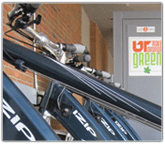 Example of quick add-on to card program
Example of quick add-on to card program
The University of Tennessee, Knoxville launched a pilot bike sharing system where users swipe their university ID card to check out and return bikes around campus.
The pilot system includes two bike-sharing stations, each with ten bikes–seven electric bicycles and three standard bicycles.
Often this type of system would have real time, or at least regularly updated, communication with the campus card system. But the UT project simply uses the student ID number off the mag-stripe and checks it against a database stored locally at the sharing station, says Christopher Cherry, assistant professor at the university.
“If they’re on the list, presto, the system gets them a bike. If not, it doesn’t. It was a really easy solution and didn’t require getting into the campus card system,” Cherry explains. “We could have used a credit card number just as easily as an identifier, but then we would be storing information that required more security … no thanks.”
But security could still be an issue with this type of solution. Storing card numbers locally on a device could leave the data vulnerable. There’s also the revocation issue, making sure that someone who no longer participates in the program cannot still access the system.
Campus card providers are able to integrate bike share programs into campus systems.
At Washington State University in Pullman the school’s CBORD system was integrated with the BIXI bike sharing system. When a student swipes the card at the BIXI station, the interface validates the patron data from the card’s magnetic stripe against the data in the CS Gold system. This ensures that the user is an enrolled student or current WSU employee before releasing a bike.
Duke University, Durham N.C., also has a bike share system that utilizes the Blackboard Transact system to track usage. Bikes are registered into the Blackboard Transact system as products and assigned point values. Using Blackboard’s credit and debit functionality, students can use their DukeCard account to borrow bikes for the day. At the Duke Bikes Web site, they can go also online to check the inventory of bikes available, reserve a bike or renew their rental.
The University of Tennessee, Knoxville’s program is unique in that it offers electric bikes. Each electric bicycle has an attached motor which activates when pedaling becomes too difficult for the rider. The sharing stations also have an integrated bike rack, with a battery-charging kiosk, which distributes batteries to those who check out the e-bikes. Students can simply swipe their campus ID to check out bikes, and return them to the station when finished.
CycleUshare developed the two automated bike stations, which consist of an automated kiosk for check-in and check-out, as well as an integrated battery vending system whereby a user places an existing used battery for recharging and obtains a charged battery.
If successful the system may be adopted into a full-scale program by the university. Perhaps then the project will pursue a more integrated tie-in with the campus card system to take advantage of additional benefits such as revocation and enrollment status.




